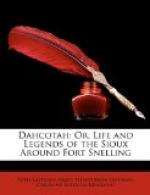Placed under the government of the United States, these helpless, unhappy beings are dependent upon us for the means of subsistence, in a measure, and how much more for the knowledge of the true God? Churches will soon rise where the odious feast and medicine dance are celebrated, but will the Indians worship there? When the foundations of these churches are laid, the bones of the original owners of the country will be thrown out—but where will be the souls of those who were thrust out of their country and their rights to make way for us?
I have seen where literally two or three were met together—where in a distant country the few who celebrated the death of the Redeemer were assembled—where the beautiful service of our church was read, and the hearts that heard it responded to its animating truths. We rejoiced that the religion which was our comfort was not confined to places; here were no altars, nor marble tablets—but here in this humble house we knew God would meet and be with us.
An Indian silently opened the church door and entered. As strange to him was the solemn decorum of this scene, as to us were the useless ceremonies we every day witnessed. He watched the countenance of the clergyman, but he knew not that he was preaching the doctrine of a universal religion. He saw the sacred book upon the desk, but he could not read the glorious doctrine of a world redeemed by a Saviour’s blood. He heard the voice of prayer, but how could his soul like ours rise as on eagle’s wings, and ascend to the throne of God! Who was he, this intruder? It may be a descendant of those who guarded the oracles of God, who for a time preserved them for us.
No wonder he tired and turned away. Not his the fault that he did not join in the solemn service, but ours. If we disregard the temporal wants of the Dahcotah, can we shut our ears against their cry, that rises up day after day, and year after year,—Show us the path to happiness and God?



